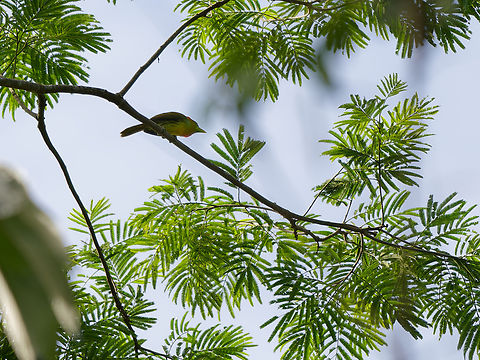
Appearance
The scarlet-hooded barbet is approximately 17 cm long and weighs 40 to 44 g. The male's entire head, throat, and upper mantle are red but for a bit of black around the eye and bill. The rest of the upperparts are green. Its lower breast is orange and yellow; it has a gray patch on the side and the flanks are streaked with olive. Most of the female's head is also red, but the throat is yellow. It has an orange band on the upper breast and the rest of the underparts are like the male's.Distribution
The scarlet-hooded barbet is found in the upper Amazon Basin where eastern Peru, western Brazil, and a bit of western Bolivia meet. More than half of its range is in Peru. It inhabits bamboo and "Heleconia" in dense understory, always within approximately 150 m of rivers and oxbow lakes. It can also be found in overgrown gardens near rivers and on river islands. In elevation it ranges from approximately 150 to 850 m.Status
The IUCN has assessed the scarlet-hooded barbet as being of Least Concern. However, "[further] data [are] required on its breeding habits and requirements."Reproduction
The scarlet-hooded barbet nests in Peru in July and possibly. Like all New World barbets, it excavates a nest hole, usually in a tree, but virtually nothing else is known about its breeding phenology.Food
The scarlet-hooded barbet's diet is approximately 60% fruits such as figs and "Cecropia " seeds and 40% insects and other arthropods of many kinds. It also eats flowers and nectar. It forages from near the ground up to approximately 11 m by gleaning fruits and probing dead leaf clusters for insects. It joins mixed-species foraging flocks.References:
Some text fragments are auto parsed from Wikipedia.